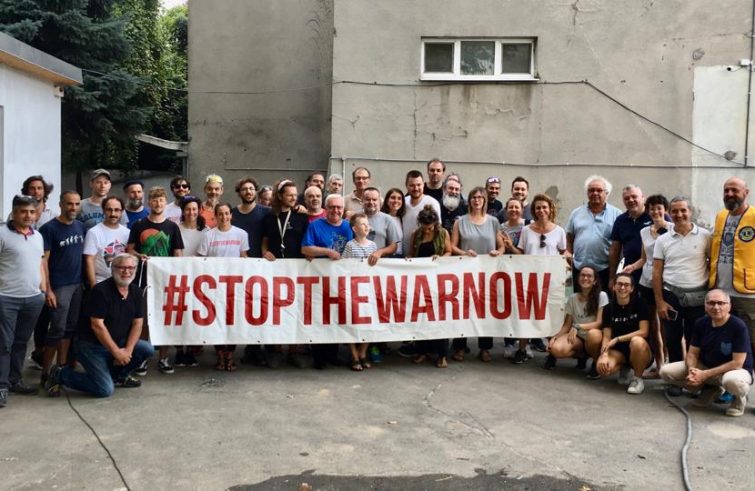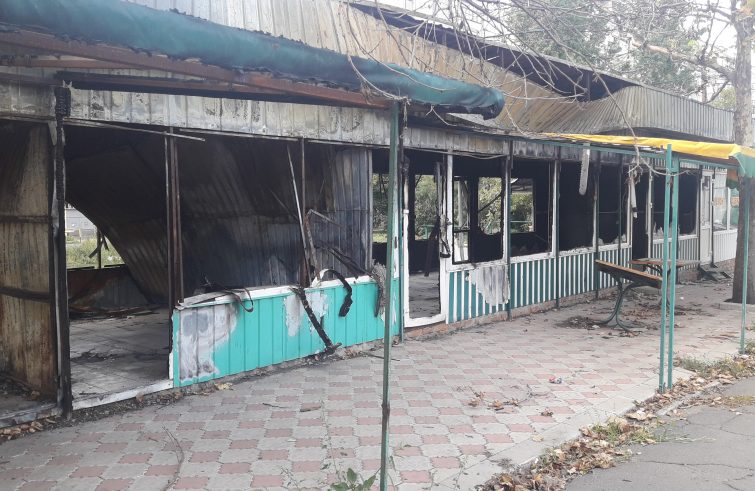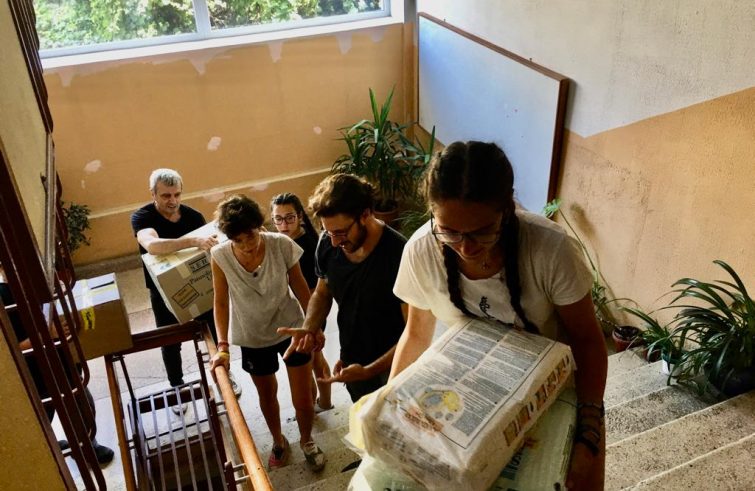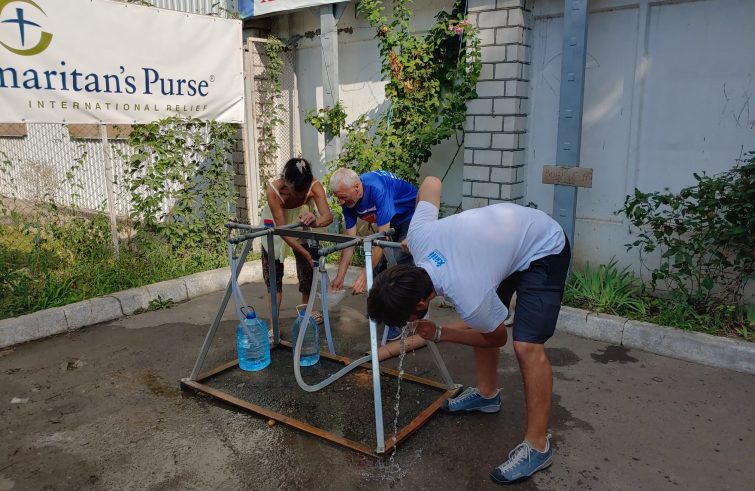
Explosions. Sudden, loud blasts. Followed by the sound of siren alerts. It’s everyday life in Mykolaiv. The battlefront is only five kilometres away. There is heavy fighting. You can tell from the soldiers standing around, armed with machine guns and bulletproof vests. You can tell from the ”sounds” of war. Elsewhere, the situation is different. There is definitely a calmer situation in Odessa, despite the security checkpoints when entering the city and the detailed document controls and vehicle inspections. Tensions are running high at the moment.
 Sixteen missiles struck Mykolaiv two days ago. Even the bridge connecting Odessa and Mykolaiv was destroyed by the Russians. More than half of the population (a total of 400,000 inhabitants) have fled. Most of those who remained are the elderly, who find it hard to leave the country. Food and water access are the most critical emergencies. Stores and malls have shut down. The buildings lining the city’s boulevards bear the scars of missile attacks. Scorched buildings, bullet-ridden walls, broken windows. Shelling hit a kindergarten on March 13. “They target our schools to hurt our children. It’s an act of terrorism”, says the head teacher with tears in her eyes. She asks us not to disclose the address or the name of the school because “people are afraid of being attacked again.” Schools will reopen on September 1st to in-person education in some parts of the country, to send a sign that despite the war, people are not yielding to the logic of hatred. However, in other regions marked by heavy fighting, children and youths will be required to attend classes online. That will be the case in Mykolaiv.
Sixteen missiles struck Mykolaiv two days ago. Even the bridge connecting Odessa and Mykolaiv was destroyed by the Russians. More than half of the population (a total of 400,000 inhabitants) have fled. Most of those who remained are the elderly, who find it hard to leave the country. Food and water access are the most critical emergencies. Stores and malls have shut down. The buildings lining the city’s boulevards bear the scars of missile attacks. Scorched buildings, bullet-ridden walls, broken windows. Shelling hit a kindergarten on March 13. “They target our schools to hurt our children. It’s an act of terrorism”, says the head teacher with tears in her eyes. She asks us not to disclose the address or the name of the school because “people are afraid of being attacked again.” Schools will reopen on September 1st to in-person education in some parts of the country, to send a sign that despite the war, people are not yielding to the logic of hatred. However, in other regions marked by heavy fighting, children and youths will be required to attend classes online. That will be the case in Mykolaiv.
 The peace caravan arrived yesterday amidst this war-torn scenario. The caravan travelled across Ukraine with 10 minibuses bearing the inscription ‘Stop the war now’. Fifty Italian volunteer workers, representing 175 associations and movements, brought tons of humanitarian aid to the suffering population. Part of it was delivered to the Razom centre, affiliated with Odessa’s Caritas centre. The rest goes to a facility run by a Pentecostal church that has become vital for the local population since the outbreak of war, with large underground emergency shelters when air raid sirens sound. They help 10,000 families survive every month by distributing basic necessities such as food, clothing, baby nappies, and sanitation items. This is where a few volunteers from the Pope John XXIII Community have chosen to live for the past three months. “Besides the aid supplies, we bring our life, our presence,” says Alberto Capannini, one of the volunteers now living here. “We don’t want to leave these people alone. This is probably the most humane thing we can do at the heart of this war.”
The peace caravan arrived yesterday amidst this war-torn scenario. The caravan travelled across Ukraine with 10 minibuses bearing the inscription ‘Stop the war now’. Fifty Italian volunteer workers, representing 175 associations and movements, brought tons of humanitarian aid to the suffering population. Part of it was delivered to the Razom centre, affiliated with Odessa’s Caritas centre. The rest goes to a facility run by a Pentecostal church that has become vital for the local population since the outbreak of war, with large underground emergency shelters when air raid sirens sound. They help 10,000 families survive every month by distributing basic necessities such as food, clothing, baby nappies, and sanitation items. This is where a few volunteers from the Pope John XXIII Community have chosen to live for the past three months. “Besides the aid supplies, we bring our life, our presence,” says Alberto Capannini, one of the volunteers now living here. “We don’t want to leave these people alone. This is probably the most humane thing we can do at the heart of this war.”
Local town councillor Maksym Kovalenko plays a video on his mobile phone of the water coming out of household faucets. It’s brown. The large pipeline that brought fresh, drinking water to the city was among the first targets of Russian shelling in Mykolaiv. The local inhabitants have been living without water ever since. The war strategy is cruel: it kills people by making them die of hunger and thirst. Twenty-six desalinated water stations operate in the city, but at least 100 distribution points are needed to cover the entire population. A constant flow of people arrives and leaves with their bottles full. There is a woman among them. She is alone in the city with her youngest daughter.
 “Tap water is filthy and salty”, she says. Why don’t you leave? “This is our land and our home. We are not leaving”, she replies, her eyes filled with infinite tenderness, the eyes of a person who adapts but will not bend. “All we are have left is the hope that this situation will end soon and peace will be restored as quickly as possible.” Thanks to the fundraising efforts of the ‘StopTheWarNow’ network, a second water treatment unit providing clean, drinking water to the population of another district will be inaugurated today to the presence of the deputy mayor of Mykolaiv. The arrival of the peace caravan in Mykolaiv is covered by Nis-tv journalist Natalia Prihodko, one of three out of seven television channels still operating in the city. She was recently awarded a prize by President Zelensky in recognition of her work. “I remained because I want to report on what is happening here and because I want the truth to be known,” she says. “I only ask you one thing, please continue following us. Don’t forget us.”
“Tap water is filthy and salty”, she says. Why don’t you leave? “This is our land and our home. We are not leaving”, she replies, her eyes filled with infinite tenderness, the eyes of a person who adapts but will not bend. “All we are have left is the hope that this situation will end soon and peace will be restored as quickly as possible.” Thanks to the fundraising efforts of the ‘StopTheWarNow’ network, a second water treatment unit providing clean, drinking water to the population of another district will be inaugurated today to the presence of the deputy mayor of Mykolaiv. The arrival of the peace caravan in Mykolaiv is covered by Nis-tv journalist Natalia Prihodko, one of three out of seven television channels still operating in the city. She was recently awarded a prize by President Zelensky in recognition of her work. “I remained because I want to report on what is happening here and because I want the truth to be known,” she says. “I only ask you one thing, please continue following us. Don’t forget us.”
“We are not war correspondents. We are envoys of peace,” says Msgr. Giovanni Ricchiuti, bishop of Altamura, president of Pax Christi Italy. He has brought along some wreaths blessed by Pope Francis. He hands them out with a blessing and an embrace of fraternity and peace. “Mykolaiv is sadly a city that bears the scars of heavy shelling. Along the way, we passed by battered buildings and an almost deserted city. We are here to offer tokens of charity and words of peace. We are confident that days of peace will come. Now we must not wait with our arms folded, but rather as artisans of peace, in the way Pope Francis has asked us to be, and as agents of peace according to the Gospel.”











